

To stay relevant, every business field must innovate rapidly, offer more, and improve what it already has.
Well, here we focus on hotel businesses and what they can do to evaluate their guest experience and, therefore, their income.
At first glance, it seems that everything that could be done is done, and every innovation that could be made is made, but is that the truth?
Of course not! There is always potential to grow and expand. This time, that potential is called a modern hotel in-room entertainment solution, an integration that maximizes guest satisfaction and increases revenue.
Read on to find out how.
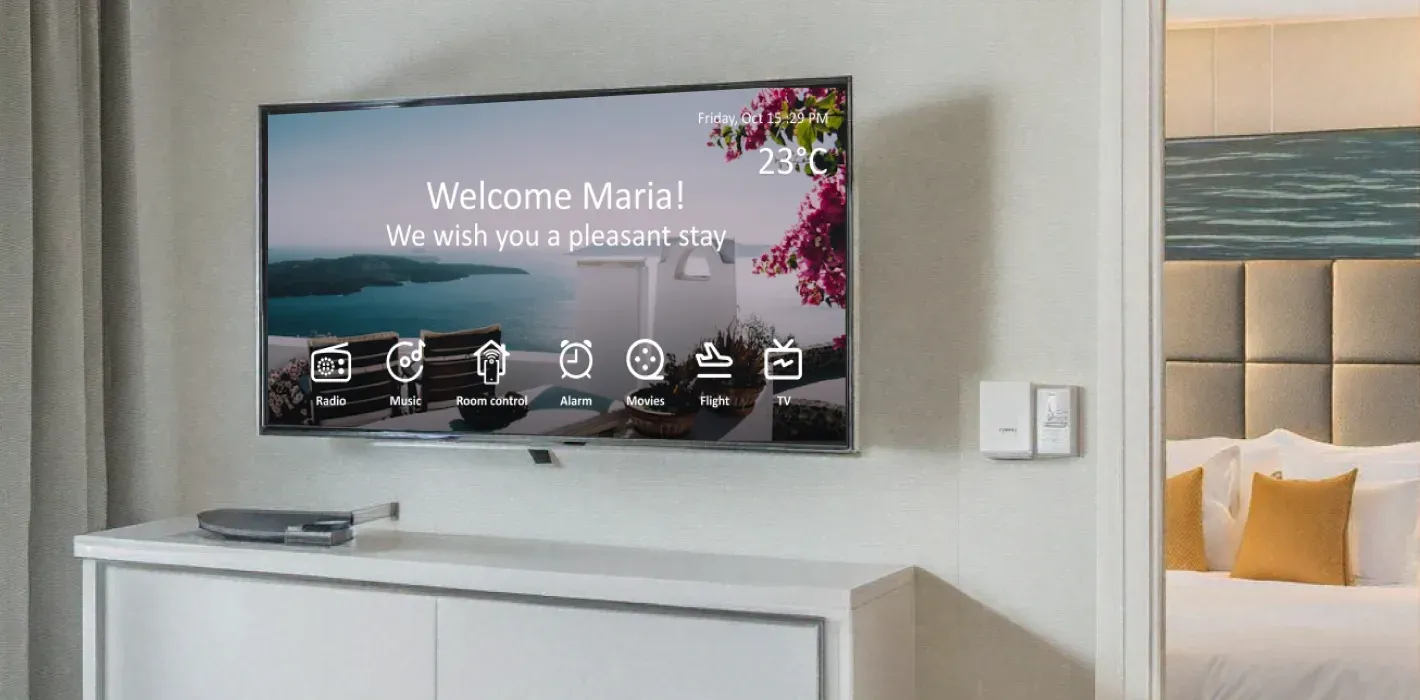
As new technologies emerged, hotel in-room entertainment systems have evolved rapidly in the past few decades.
Hotel in-room entertainment dates back to 1927, when the Boston Park Plaza Hotel first introduced radios, while televisions debuted at the Roosevelt Hilton in New York City in 1947. In the 1960s, hotels and motels started advertising the arrival of color TVs.
By the 1970s, free movie channels and pay-per-view films were the next “big thing” among the best hotels. They later became common in motels, lodges, guesthouses, hotels, and resorts.
Thirty years later, this trend caused movie rental income to drop by an average of 8.5% between 2000 and 2022. Movie rentals cost under $1.20 per night for occupied hotel rooms in the 2000s. By 2022, that figure plummeted substantially to just 17 cents, highlighting the ever-increasing popularity of free and pay-per-view movies.
However, modern hotels' variety of in-room entertainment options extends beyond traditional television.
Today, internet-connected TVs enable smart interactions, online services, and streaming capabilities to provide guests with a top-tier, customized, and immersive experience during their stay.
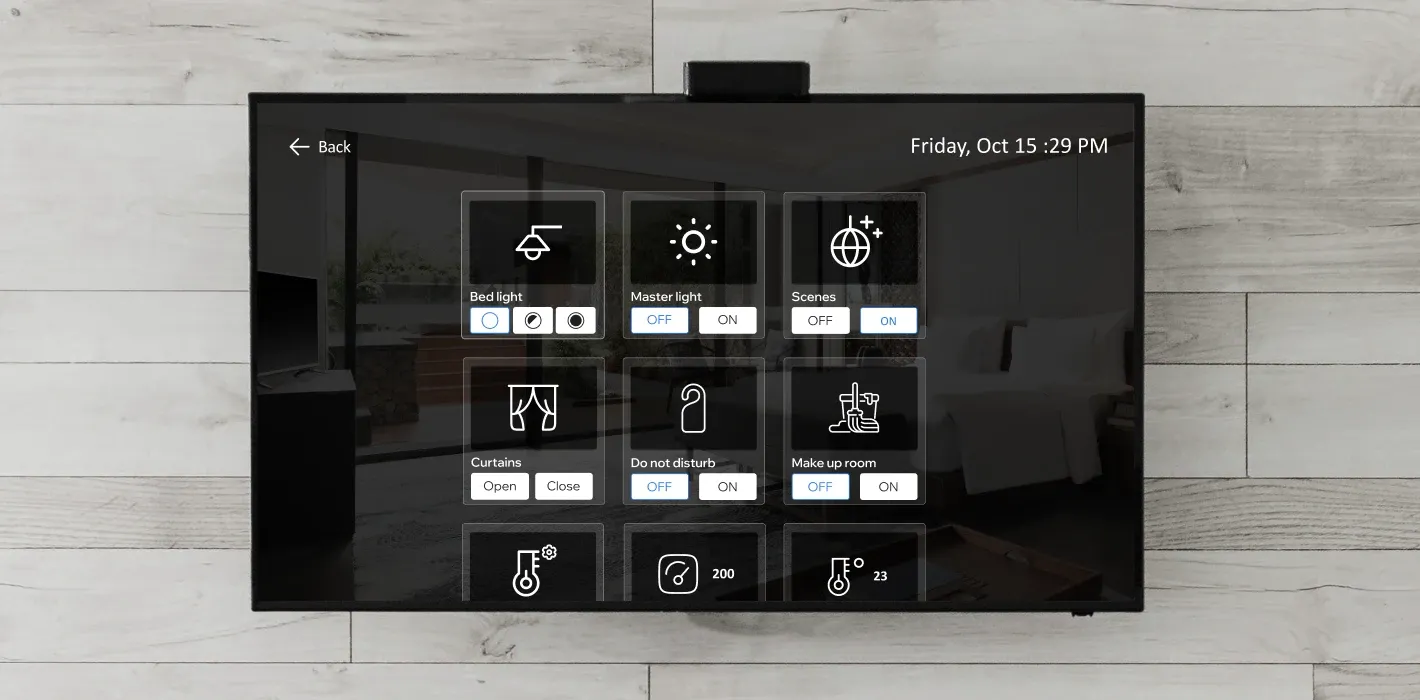 Some of these facilities also have income-generating potential. Modern interactive technology enables in-room entertainment devices such as tablets and smart TVs to offer guests more than just the ability to stream their favorite TV shows or live sporting events.
Some of these facilities also have income-generating potential. Modern interactive technology enables in-room entertainment devices such as tablets and smart TVs to offer guests more than just the ability to stream their favorite TV shows or live sporting events.
Artificial intelligence allows these devices to offer personalized recommendations for local attractions, dining options, and hotel services, encouraging guests to explore premium content and experiences. AI-driven systems can also analyze guest preferences and behavior to suggest additional amenities through in-room smart TVs or devices, such as spa treatments, room service, or exclusive hotel events.
Let’s go through the main components of modern in-room entertainment systems.
Smart TVs are standard in hotel rooms nowadays. They provide access to games, social media, streaming services, and other apps, allowing guests to experience their favorite content precisely as they would in the convenience of their own homes.
Using a hotel middleware platform, hotel owners and managers can customize in-room entertainment experiences to align with their brand identity and meet specific guest preferences.
In the table below, you can see a hotel middleware platform’s features.
| Feature | Description |
|---|---|
| Personalized Content Recommendations | Suggests TV shows, movies, and other content based on guest preferences. |
| Branded User Interface | Customizes the look and feel of in-room entertainment with hotel branding. |
| Targeted Promotions & Messages | Displays personalized promotions, advertisements, or hotel messages on smart TVs and tablets. |
| Guest Interaction Data Collection | Tracks and analyzes guest viewing habits and preferences for service improvements. |
| Integration with Third-Party Apps | Supports virtual concierge services, local attraction guides, and other external applications. |
| Smart Room Control | Allows guests to adjust room temperature, lighting, and curtains via TV or tablet. |
| Room Service Requests | Enables guests to order food, housekeeping, and other services directly through the TV interface. |
| Multi-Device Synchronization | Connects smart TVs with guest smartphones, tablets, or laptops for a seamless experience. |
| Multi-Language Support | Offers user interfaces and content recommendations in multiple languages for international guests. |
| Flexible & Scalable System | Ensures hotels can adapt and expand entertainment offerings based on guest needs and technology advancements. |
Looking for a reliable hotel middleware platform? Contact HotelSmarters today to get your hotel middleware platform with interactive features and system integrations.
According to Exploding Topics, the gaming sector has become a major actor in the entertainment sector over the past several years; its value is an astounding $282 billion.
Contrary to popular belief, gaming isn’t limited to younger generations. In fact, recent data indicates that 38% of all players fall between the ages of 18 and 34, while 26% fall between the ages of 35 and 54.
According to recent research, these numbers account for all players between the ages of 18 and 54, making up 64% of all gamers.
Gaming consoles like the Nintendo Switch, PlayStation, and Xbox have become popular choices for hotel in-room entertainment systems, appealing to guests of all ages.
Most hotels and resorts provide audio systems with Bluetooth connectivity, excellent speakers, and streaming capabilities. Guests can enjoy their chosen audio content—podcasts and music, among other things- with remarkable clarity.
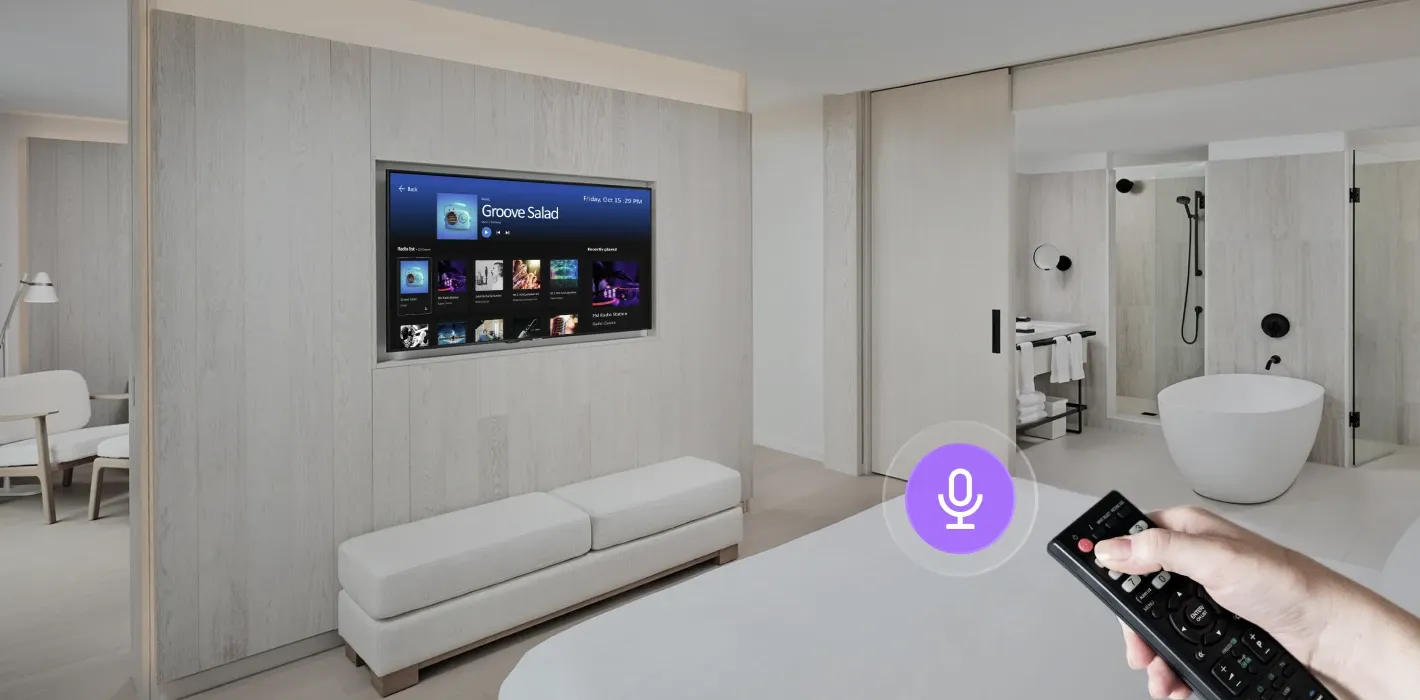 Data from Pew Research shows that the number of Americans listening to podcasts has risen significantly. Reflecting this trend, the number of music streaming customers has grown dramatically since the end of 2015—from 68 million to 616.2 million.
Data from Pew Research shows that the number of Americans listening to podcasts has risen significantly. Reflecting this trend, the number of music streaming customers has grown dramatically since the end of 2015—from 68 million to 616.2 million.
Hotel in-room entertainment systems meet the growing need for customization by letting guests enjoy their music or other audio content from their devices.
Smart mirrors accentuate the sophisticated touch of the hotel bathroom experience. These components of hotel entertainment may show news, weather updates, and even let one browse the internet.
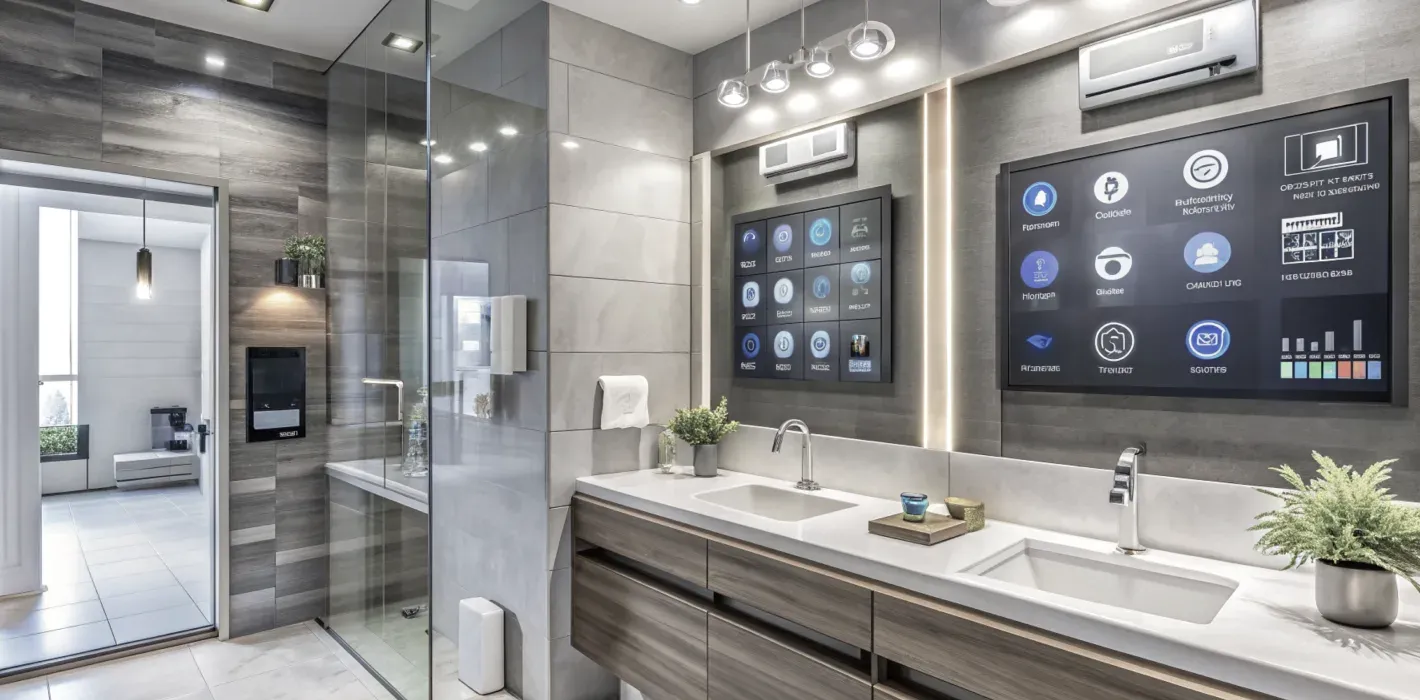 Other models have integrated illumination, anti-fog properties, and touch control. Smart mirrors improve the guest experience by deftly blending elegance with utility.
Other models have integrated illumination, anti-fog properties, and touch control. Smart mirrors improve the guest experience by deftly blending elegance with utility.
Smart showers give guests a much more personalized bathing experience. Guests can pre-set their favorite water temperature, pressure, and shower length. Other variants additionally offer further capabilities, including integrated sound systems and steam control. Through their spa-like qualities, smart showers enhance the guest's experience with a hint of luxury.
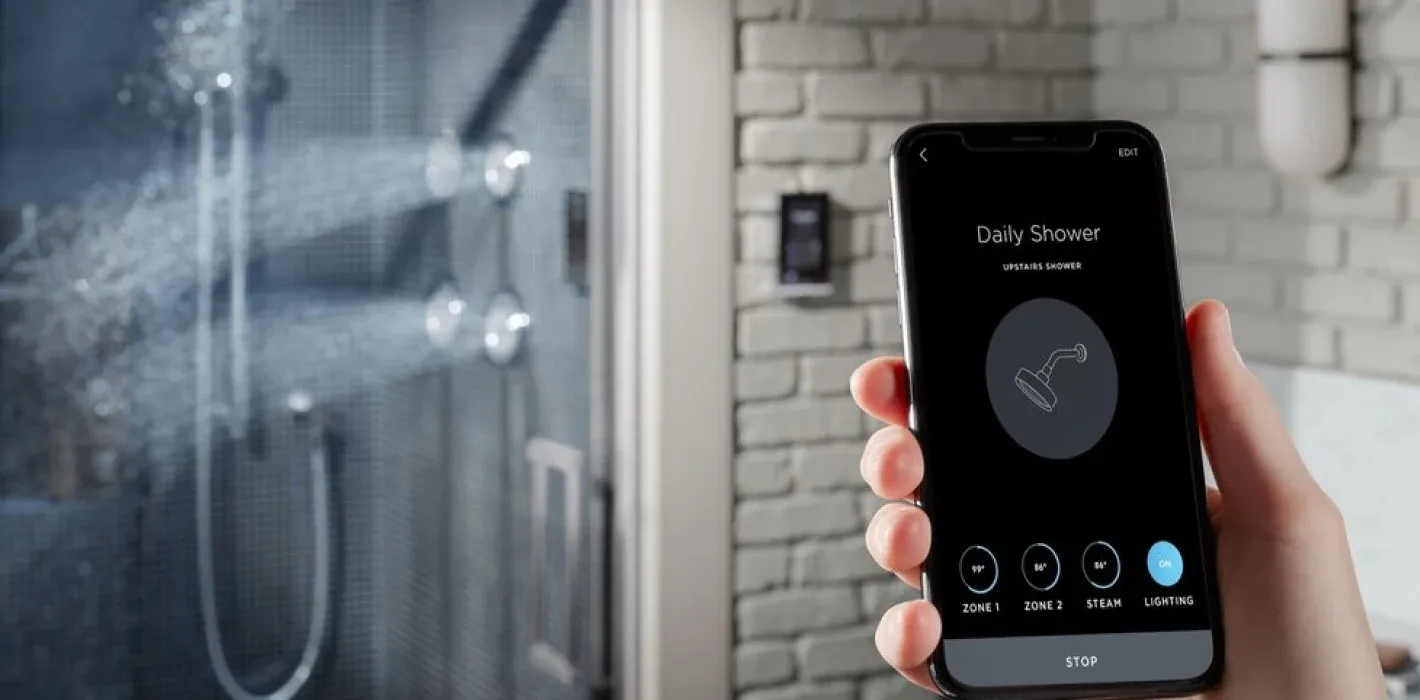
Given the general use of cell phones and other wireless devices, guests always appreciate wireless charging in hotel rooms. Without the trouble of finding or traveling with the correct wires or outlets, guests may readily charge their gadgets anywhere in the room.
Several hotels have begun including wireless charging in their furniture—desks and bedside tables—to give their guests even more convenience.
Some of the benefits of hotel in-room entertainment systems include:
Hotel in-room technology considerably increases guests' comfort. Every element of their experience—including the ambiance, temperature, and even the mattress firmness in some premium hotels—can be tailored to them. Imagine a guest arriving in a hotel following a long journey; the room is already configured to suit their tastes, creating a familiar and cozy atmosphere immediately.
With a smart TV management platform, hotels can offer guests diverse content on demand, along with personalized advertising or informational channels. Guests can enjoy their preferred shows and music playlists as they would in the comfortable familiarity of their own homes and receive customized offers or updates on the smart TV in their hotel room.
Hotel guests can control everything in their rooms without touching anything, using voice-activated controls or user-friendly apps. They don’t need to rely on the front desk for assistance or fight with foreign air conditioning settings.
Key technologies driving guest experience transformation include:
Let’s take a look at some of the challenges and considerations below.
One of the primary challenges of hotel in-room technology is integration since not all systems are designed to work together. Choose options that fit the current system or can be readily changed without significant disturbance.
Work with technology providers that offer flexible and adaptable solutions. Analyze your current systems thoroughly and choose vendors who understand your hotel's particular needs.
Using new technology means staff members must learn to adapt to new systems, which requires significant effort. As a hotel owner, excellent training programs are a wise investment. Ensure the workforce has a hands-on, slow learning approach so they may become at ease with new technologies.
You can also implement managed services, where experts take care of all aspects of your in-room entertainment systems, allowing you and your staff to concentrate on other vital responsibilities.
Given the large initial outlay involved, controlling the costs of smart hotel in-room technology is vital. Design a well-organized implementation strategy that includes distinct phases.
Start by running a pilot program in a few chosen rooms to evaluate the return on investment and technology impacts. Driven by real results, this approach allows for a methodical investment and expansion plan.
Today's guests demand a wide spectrum of content choices. The latest developments have led more and more hotels and resorts to offer rooms with smart TVs that provide a variety of popular streaming alternatives, including Netflix, Hulu, and Disney+.
This form of hotel WiFi entertainment often presents difficulties for guests, including security issues and unstable internet connections. Many guests have complained about problems with the user experience when trying to access a range of movies, TV series, and other content via their accounts.
Concerns about how their data is handled after their hotel stay could make customers reluctant to disclose their personal information on streaming apps.
Most hotel guests said they would rather wirelessly transfer apps from their devices onto the guest room TV than manually enter personal data into the television gadgets offered.
The sector is developing new ways to satisfy consumers' expectations, even if they have great demand for original content. Given the increasing reliance on technology, guest privacy is only natural to be aware of, especially with data collection and automated systems.
Ensure guests understand how their data is used and implement strict security policies to guard their records.
A remarkable experience for hotel and resort guests depends much on the guest room entertainment system and available choices. The possibilities are virtually endless, given technology's quick and continuous development.
Let’s look at some of the latest trends driving these advancements.
As smart home technology becomes more prevalent, hotels will likely integrate more smart devices into their rooms.
This integration includes voice-activated assistants, smart speakers, and IoT-enabled devices that allow guests to control entertainment systems, lighting, and climate through voice commands or mobile apps, creating a more convenient and intuitive experience.
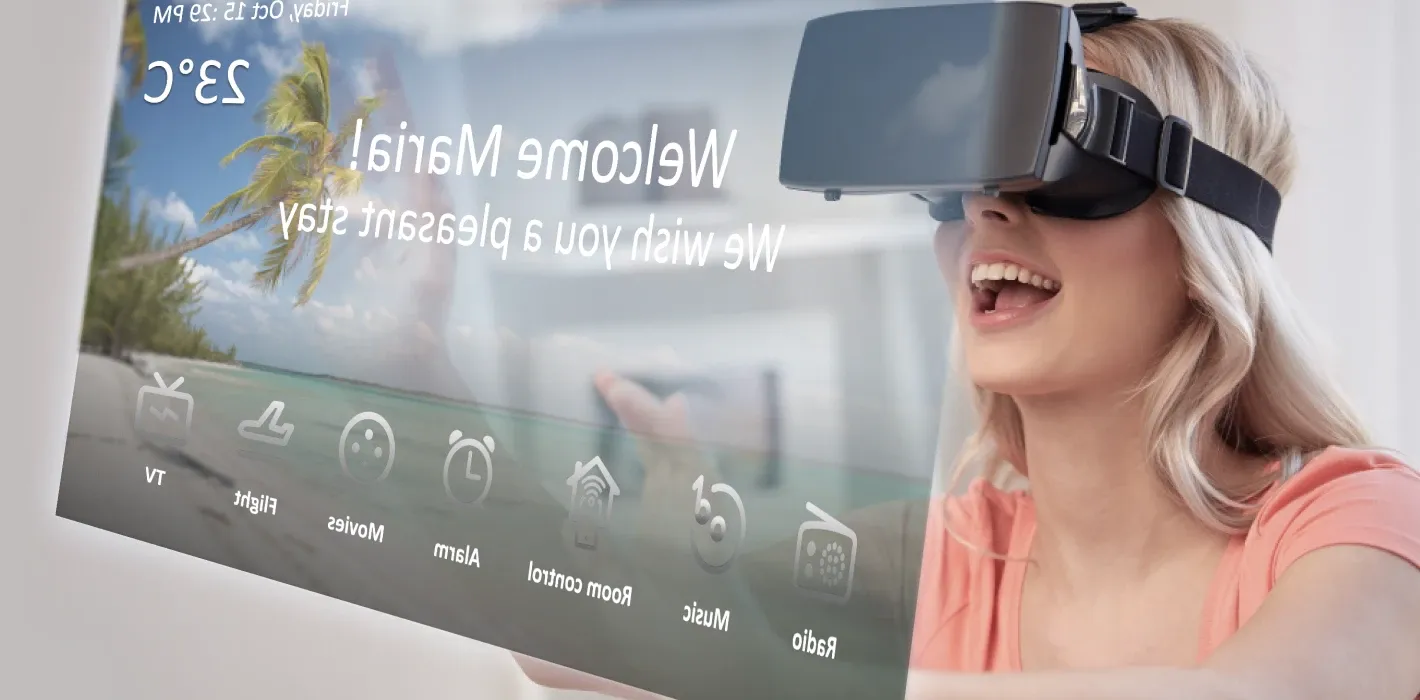 VR and AR technologies are expected to play a more prominent role in hotel entertainment systems, offering guests immersive experiences beyond traditional content. Guests might use VR headsets to explore virtual tours of local attractions, participate in interactive games, or even attend virtual events from the comfort of their rooms.
VR and AR technologies are expected to play a more prominent role in hotel entertainment systems, offering guests immersive experiences beyond traditional content. Guests might use VR headsets to explore virtual tours of local attractions, participate in interactive games, or even attend virtual events from the comfort of their rooms.
With the growing demand for streaming services, hotels invest in high-speed internet infrastructure to support seamless streaming experiences. Future trends may include partnerships with major streaming platforms, allowing guests to access their personal accounts directly from in-room devices without the need for additional logins.
Cloud technology will continue to drive the evolution of in-room entertainment by enabling hotels to offer a broader range of content without the need for extensive physical infrastructure. Cloud-based systems also allow for real-time updates and remote content management, ensuring guests always have access to the latest offerings.
As sustainability becomes a key consideration for the hospitality industry, hotels adopt energy-efficient technologies in their entertainment systems. This trend includes smart devices that automatically adjust energy usage based on occupancy and usage patterns, contributing to a more eco-friendly hotel environment.
As digital transactions and interactions increase, blockchain technology could enhance security and transparency in guest room entertainment technology. This could protect guest data and transactions, provide peace of mind, and ensure privacy.
Enhance hotel system management and elevate guests' in-room entertainment experience with a smart and simple solution from HotelSmarters!
HotelSmarters transforms hotel room TVs into smart assistants, enabling seamless management of tasks such as:
On top of these game-changing features, HotelSmarters offers simple tools and analytics for hoteliers to implement effective targeted marketing campaigns and promotions—all while effortlessly integrating with your existing billing systems.
If you’re looking for intuitive hotel in-room entertainment systems that drive revenue and elevate the guest experience, contact HotelSmarters today!
Upgrading hotel in-room entertainment is more than just a trend—it creates better guest experiences, improves operations, and supports sustainability.
Using smart technology in hotel rooms shows a commitment to meeting guests' needs, helping hotels stay competitive. It’s about keeping up with new technology and guest expectations.
Trending hotel in-room entertainment options include smart TVs with built-in streaming services like Netflix and Google Cast, voice-controlled AI assistants, and interactive systems that allow guests to personalize their experience, from adjusting room settings to booking hotel services.
Yes, hotel in-room technologies are increasingly sustainable. Many hotels are adopting smart room controls, such as energy-efficient thermostats, motion-sensor lighting, and water-saving fixtures, to reduce waste without compromising guest comfort.
Keyless entry systems also cut down on plastic waste from traditional room keys, and renewable energy sources like solar, wind, and geothermal are being integrated into hotel operations.
Yes, many smart hotel systems are designed with energy efficiency in mind. Devices can automatically adjust settings based on occupancy and usage patterns, contributing to a more sustainable and eco-friendly hotel environment.
HotelSmarters offers a central middleware platform that integrates smart TV features, personalized messages, service recommendations, and targeted advertising. The system enhances guest experience, helps hotels generate additional revenue, and provides valuable analyses and reports for the management system.
Co-founder / CTO
Armen is the CTO and Co-Founder of inoRain OTT and Co-Founder of HotelSmarters, specializing in advanced streaming technologies, OTT strategy, and interactive TV systems. He builds scalable end-to-end video delivery solutions and drives technical innovation across hospitality and streaming platforms, bridging complex engineering with practical business impact.